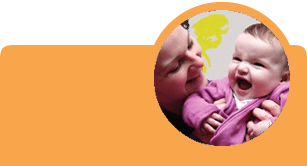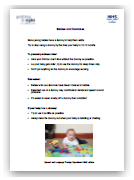
Some young babies have a dummy to help them settle. Try to stop using a dummy by the time your baby is 10-12 months.
To prevent problems later:
- Give your child as much time without the dummy as possible.
- As your baby gets older, try to use the dummy for sleep times only.
- Don’t put anything on the dummy to encourage sucking.
Remember:
- Babies who use dummies have fewer chances to babble.
- Extended use of a dummy may contribute to dental and speech sound problems.
- It’s easier to wean a baby off a dummy than a toddler!
If your baby has a dummy:
- Try to use it as little as possible.
- Always take the dummy out when your baby is babbling or chatting.
How do you get rid of a dummy?
If your child is using their dummy all the time, or is not giving their dummy up as soon as you would like, try these ideas:
- Wean them off – gradually decrease the times when you let your child use their dummy.
- Restrict dummy use to key times during the day, such as bedtime or when your child is ill. Be firm.
- Point out older girls and boys, who don’t use dummies, to your child. Pre-schoolers love being more grown-up!
- Encourage your child to give all their dummies away to a person who is important to them, such as a grandparent or pre-school key worker.
- Reward your child with fun activities, stickers or star charts – don’t give them sweets instead of their dummy.
- Remember your child will grow out of their reliance on their dummy.
Ideas that parents have tried:
- Give the dummy/bottle to Santa or the tooth fairy.
- Swap the dummy/bottle for a gift/cuddly toy/new toothbrush.
- Agree with your child to throw the dummy/bottle in the bin.





